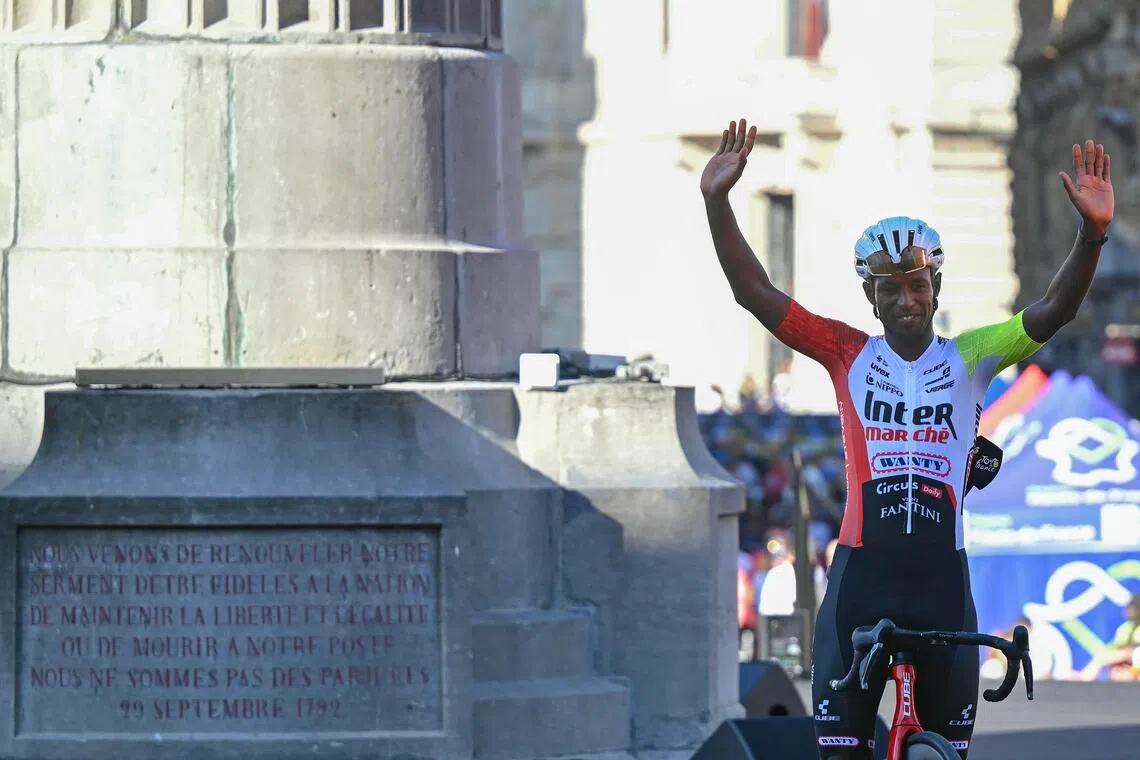In The Spotlight
Biniam Girmay is blazing a trail for African cyclists
In this series, The Straits Times highlights the players or teams to watch in the world of sport. Today, we focus on Tour de France EFGH Singapore Criterium contender Biniam Girmay, the first African to win the green jersey at the Tour de France.
Sign up now: Get the biggest sports news in your inbox

Biniam Girmay waving to spectators during the official teams' presentation ahead of the 2025 Tour de France in July.
PHOTO: AFP
In a sport awash with white faces with a sprinkling of South Americans, Eritrean Biniam Girmay is a trailblazer on two wheels.
In 2024, on his second stab at the Tour de France, he became the first black African to win a stage in cycling’s most storied showpiece.
After the Stage 3 success, he posted alongside a photo of him fist-pumping at the finishing line the caption “Let me open the door”.
By the end of the three week-race in July, considered among sport’s most gruelling challenges, the only black rider in the 176-strong peloton was resplendent in green.
The Intermarche-Wanty cyclist won three stages and the points classification green jersey, the most coveted honour for sprinters. It made him the first person from his continent to win a secondary classification at one of the three Grand Tours.
Still, he was conscious enough to say: “This year I’m the only black rider in the peloton. It’s not nice, to be honest, so I wish there were more black riders in the peloton.”
Eritrean cycling coach Aklilu Haile, who has known Girmay for a decade, insists the 25-year-old is already making an impact, telling the BBC in 2024: “Sometimes cycling seems like it’s for white people only, but now he teaches us that cycling is for all the world.”
On Nov 2, Girmay will take part in another sprinters’ showdown against Italy’s Jonathan Milan and Belgian Jasper Philipsen as the last three green jersey winners face off at the Tour de France EFGH Singapore Criterium, with former Olympic time-trial gold medallist and 2024 Vuelta a Espana champion Primoz Roglic of Slovenia thrown in for good measure.
But it has been a wild ride for Girmay to get here.
Girmay’s origin story
He was born in Asmara, the capital of Eritrea, a country in the Horn of Africa along the Red Sea with a population of around 3.5 million.
Girmay was prodded to take an interest in cycling by his carpenter father, who would put the Tour de France on the TV and exalt how it is “the No. 1 sport in the world”.
While Eritrea does not have the pedigree of cycling’s top-tier nations, in 2015, Daniel Teklehaimanot opened the door for Girmay and African riders in general when he became the first black rider to don a jersey at the Tour de France, enjoying three days in the polka-dot jersey reserved for the best climber.
Girmay’s former coach Jean-Jacques Henry told the BBC in 2023: “Cycling is Eritrea’s No. 1 sport. They have the same potential as Kenyans, who are champions in athletics.
“If you transfer this potential – endurance potential on the bicycle – they can be the best in the world.”
His charge triumphed in his first mountain bike tournament aged 12 and was picked to represent his nation as a junior in the African Championships.
There, he caught the eye of an International Cycling Union (UCI) scout and by the time he was 17, he quit school and moved to the Swiss Alps to train at the global governing body’s World Cycling Centre, which helps develop athletes from nations with limited opportunities.
But he struggled with the transition.
Said the Eritrean: “For one year I almost didn’t do anything because I needed to learn. I knew nothing about Europe – it was totally different to Eritrea. I needed to learn English, to learn the cycling language, and that takes a while.”
But by 2020 he turned professional with French team Delko. But the Covid-19 outbreak left him unable to compete in Europe amid the cancellation of races.
By 2021, Delko had gone bust. Girmay went home to marry his wife Saliem and shortly after she gave birth to their daughter, Africa’s great cycling hope returned to Europe after being picked up by Belgium-based Intermarche-Wanty.
An early breakthrough
In September 2021, he offered an early sign of his potential on the world stage, taking silver in the Under-23 road race at the UCI Road World Championships to become the first black African to ascend the podium in the championships’ history.
In March 2022, he won his first Classic at Gent-Wevelgem, another first for Africa. Two months later he moved from one-day racing to his first Grand Tour, the multi-week Giro d’Italia.
Speaking before the event, Girmay said: “I want to win more Classic Monuments, but the Grand Tours are always in my dream – it’s all African cyclists’ dream to win in a Grand Tour.
“Black riders have never won a Grand Tour stage. For us, getting this will be the best moment ever.”
It proved prophetic.
On Stage 10, he pipped Monuments master Mathieu van der Poel of the Netherlands to the finishing line in Jesi.
But as seems to consistently be the case with Girmay, things are rarely straightforward. On the winner’s podium, he accidentally injured his eye with a prosecco cork and had to be taken to hospital. The following day, he confirmed that he would quit the race.
The Eritrean’s rise has also not been linear. After his breakthrough 2022, the following season proved more fallow, with no major wins.
Then came the heroics of the 2024 Tour de France.
“To be one of the big symbols of Africans, a big pressure I know, but on the other hand, it’s really powerful to push me,” Girmay told Eurosport in 2024.
In 2025, he did not win a major race and ceded his 2024 Tour de France green jersey to Milan without winning a stage. There is also uncertainty at the prospective merger of Intermarche-Wanty and Lotto.
Impact on Africa
Wherever Girmay ends up, his wider impact remains indubitable.
His agent Alex Carera, who also manages four-time Tour de France champion Tadej Pogacar, told Marca: “(Girmay’s) emergence has changed the landscape. Not only because of his victories, but because of what he represents. Africa is no longer a promise – it’s the present.”
According to the BBC, at the 2025 Tour of Mersin, 17 of the 171 starters were from Africa, the largest contingent from the continent at an UCI-sanctioned professional road race in Europe.
Meanwhile, non-profit Team Africa Rising said there were nearly 150 male and female cyclists from Africa who are on professional contracts this campaign.
As 21-year-old Eritrean sprinter Milkias Maekele, who made his professional debut at the Tour of Mersin, told the BBC: “Many people have told me I might become the second Biniam.
“I am incredibly happy about this and it gives me so much motivation.”



